How "Ecotopia" Tests a Man’s Soul
William Weston’s journey in "Ecotopia" reveals a man tested by a new civilization—and strengthened by it, proving that true morality comes from courage, reflection, and earned conviction.

A Man Sent to Judge
In Ernest Callenbach's "Ecotopia," William Weston is not just a journalist—he is a cultural ambassador from a crumbling empire. Sent by a skeptical United States to report on the breakaway ecological nation, Weston carries with him the unspoken authority of a civilization convinced of its own superiority. His mission is to observe and analyze, but also, implicitly, to judge.
What he encounters is not merely a different political arrangement, but a reimagining of what it means to be civilized. Ecotopia challenges the very assumptions that have shaped his understanding of order, strength, and moral clarity. It is a land where decentralization is a strength, emotion is a public virtue, and balance with nature is the highest good. For Weston, the assignment quickly becomes personal.
He must confront not only an unfamiliar society but the frailty of the world he thought was unshakable. In doing so, he begins to question what a man owes to truth, and to himself.
Thank you for the clarification. Let's recast this section to emphasize William Weston's strengths—even in his early mindset—highlighting his integrity, discipline, and sense of duty as expressions of a moral code shaped by his civilization.
Civilization Without a Compass
At the beginning of "Ecotopia," William Weston is a man molded by discipline, clarity, and purpose. He believes in a civilization built on law, industry, and responsibility—a world where strength lies in structure and order. These beliefs are not hollow slogans to him. They are moral convictions rooted in service to a society that values achievement and stability.

Weston's loyalty to the United States is not blind but principled. He sees the civic and technological advances of his homeland as hard-won triumphs of will and intelligence. In his view, the high-rises, power grids, and vast systems of governance are not soulless machines—they are monuments to human effort and moral progress. His task in Ecotopia is not sabotage, but honest assessment.
His skepticism is the skepticism of a man who takes ideas seriously. He questions Ecotopia not out of fear, but because he understands that civilization must be tested to be trusted. Weston's doubts are not personal insecurities—they are signs of a mind that believes moral clarity requires rigorous proof. He does not mock what he sees. He examines it.
Weston's strength is that he enters Ecotopia with his eyes open and his standards intact. He brings with him the best of his world—its discipline, its courage, its belief in order. What he lacks is not a moral compass, but exposure to a different kind of map. And that's what makes his journey not a collapse, but a refinement.
Trials in the New World
Weston's arrival in Ecotopia marks the beginning of a series of personal trials—not physical dangers, but moral and philosophical tests. He is plunged into a culture that rejects the very foundations of his worldview. Yet he does not panic or retreat. He watches, listens, and records with the steadiness of a man who honors his duty, even in unfamiliar territory.

His hosts do not offer lectures—they live their values openly. Weston observes neighborhoods governed by consensus, factories that operate in harmony with nature, and citizens who express emotions without shame. These practices unsettle him, not because they are weak, but because they are coherent. The society seems to function without coercion, something he never thought possible.
Rather than dismiss what he sees, Weston struggles with it. He questions how a civilization can survive without centralized control, or how people can maintain order without a strict hierarchy. Yet the more time he spends among the Ecotopians, the more he sees that discipline does not vanish—it simply shifts inward. Their restraint is voluntary, rooted in shared values rather than imposed laws.
Weston's reports become more personal, more reflective. He begins to recognize that his old moral framework, while strong, might not be the only one that produces honorable men. He sees fathers raising children without rigid roles, communities solving problems without top-down orders, and citizens who sacrifice convenience for the good of the land. These are not signs of collapse. They are signs of character.
What makes Weston's journey compelling is not that he is defeated, but that he adapts. His trials test his judgment, not his integrity. In grappling with a new civilization, he reveals the truest measure of a man—not how firmly he holds his views, but how honestly he tests them.
Choosing a Moral Civilization
Weston's turning point doesn't arrive all at once. It builds through observation, reflection, and the quiet accumulation of doubts. The systems he once believed essential—bureaucracy, emotional restraint, industrial dominance—begin to look less like virtues and more like habits. He sees that Ecotopia's strength lies not in rejecting responsibility, but in sharing it.

A key moment occurs when Weston witnesses the ritual war games. What at first appears barbaric reveals itself as a structured outlet for conflict, where aggression is channeled and resolved without lasting harm. He understands that these people have not abandoned discipline—they have refined it. Their rituals are not primitive. They are precise tools of moral engineering.
Another shift happens in Weston's personal relationships. His connection with Marissa is more than romantic—it's revelatory. She speaks with conviction, lives with intention, and demands honesty. In her, Weston sees a model of integrated living, where emotion, intellect, and action align. Their bond forces him to admit that sincerity is not weakness. It is strength on a human scale.
Weston does not reject his old values. He begins to see them as incomplete. Civilization, he realizes, is not measured by its machinery but by the moral maturity of its people. A society can be clean, well-ordered, and still corrupt. Another can look chaotic yet be deeply just.
In choosing to remain in Ecotopia, Weston is not betraying his past—he is fulfilling it. He recognizes that real civilization is not about how many systems a society can build, but how many it can outgrow. His decision is not emotional surrender. It is moral courage, the kind only a real man can exercise when he learns something new and admits it.
Manhood Reforged
By the end of "Ecotopia," William Weston is no longer simply a messenger from another world. He has become a man who has tested his convictions against a living experiment in civilization—and found deeper truth. He does not throw away everything he brought with him. Instead, he refines it, keeping only what proves worthy in the light of a higher moral standard.

Weston's transformation is not a rejection of discipline or order. It is their elevation. He discovers that strength can live in quiet places, that leadership can come without command, and that a man's worth is found not just in his certainty, but in his honesty. Ecotopia does not weaken Weston—it completes him.
His decision to stay is not a flight from responsibility. It is an embrace of a new one. He chooses to belong to a civilization where morality is not enforced by power, but sustained by character. In doing so, Weston becomes more than an observer. He becomes a participant in the only kind of civilization that endures—one built not on fear, but on principle. That, in the end, is the real measure of a man.

